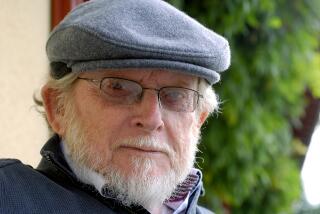Love at Any Cost
- Share via
NEW YORK — David Hare sets the bar high for himself in “The Judas Kiss,” his new play about the love affair between Oscar Wilde and Lord Alfred Douglas. History has viewed Lord Alfred much as Wilde’s friends did--as a blazingly selfish wannabe who ruined the life of a great and generous writer. No one has ever been able to sufficiently explain why Wilde sacrificed himself for such a man. Hare attempts, heroically, to imagine the tragedy from a new angle, from deep inside his own version of Wilde, a man less posturing and arrogant than the character other dramatists and filmmakers have constructed. Hare seamlessly melds his own poetry and witticisms with Wilde’s, as opposed to the way it’s always been done--with a heavy reliance on Wilde’s epigrams.
“The Judas Kiss,” transported directly from London’s Almeida Theatre Company, opened on Broadway at the Broadhurst Theatre Wednesday night. As Wilde, Liam Neeson offers a refreshing portrait, one that entirely ignores the rouged victim, the lumbering literary giant who somehow could not save himself from obvious disaster.
Egged on by Lord Alfred, Wilde entered into a legal confrontation with Lord Alfred’s father, the marquess of Queensberry. The suit resulted in imprisonment and hard labor for Wilde for the crime of committing acts of gross indecency. Upon Wilde’s release two years later, Lord Alfred failed to help support the destitute and broken writer, though they lived together, briefly, in Naples.
Act 1 depicts the few hours before Wilde’s arrest, time he mystifyingly spends waiting in Lord Alfred’s London hotel suite, though he could flee to France. Here, Neeson plays a man in manic denial, agitated, deaf to sense or self-preservation. Wearing an ingratiating and desperate smile, he repeatedly tries to give what little money he has to the staff. Neeson fails to provide a reason for Wilde’s behavior here, except to suggest that he is in mental disarray. Anyone not already engaged in Wilde’s story may be confused as to why they should care about this unnecessary martyrdom.
The more engrossing second act takes place post-prison, in a bare Naples villa (designed with unusual restraint by Bob Crowley). Neeson is harrowingly changed--sunken eyes, ashen face, the long hair that once flowed romantically is oiled back; he looks like an Edvard Munch ghoul. It’s no coincidence that Neeson’s performance is much richer in this act; here, Hare gets at the deep anger, the pride and the poetry behind Wilde’s stubbornness. In a brilliantly written scene, Hare provides an original answer to the central question--why did Wilde love the pitifully shallow Lord Alfred? Wilde speaks of the act of loving, not as a failing or an illusion, but as the only pure action in an impure world. Hare makes us see that Wilde’s only recourse is to insist on beauty and honor and loyalty when the world said these things did not exist and that he was a monster. Broken but unbowed, Neeson delivers the full, sad majesty of this position.
There remains, however, one dramatic problem, complicated further by the casting of Tom Hollander as the young Lord Alfred. Others have depicted Wilde as a sad victim of his appetites. Since Hare’s Wilde is not a victim, how then do we understand, without condemning, his love for so unworthy a person?
Under Richard Eyre’s precise and sober direction, this production physically emphasizes how grotesquely mismatched in stature the two were--Hollander is half the size of Neeson, with a curly head of hair that looks perpetually tousled. He has a habit of sneering when insulting his betters.
“I know this is difficult to hear, but from my point of view, our situation is far worse for me,” says Lord Alfred to Wilde, and the breathtaking gall of this is readily apparent. But something else should be apparent too: We all are capable of being that selfish, of thinking only of ourselves in the midst of someone else’s tragedy. Hollander is such a clownish, boorish figure that he makes it easy for us to separate ourselves from him. The casting in this role perhaps suggests Hare’s own ambivalence toward Lord Alfred.
Nevertheless Hare’s passion for his subject is evident from the play’s first image: A naked woman stands on a bed in a Christ-like position, while below her a nude man kneels in a graphically sexual act. These lovers turn out to be servants, borrowing Lord Alfred’s bed while he is away, and they christen the play with a striking image of carnality and martyrdom all tied up together. Hare has brilliantly illuminated this image and projected it onto history’s most tragic literary figure. But his vision can only extend so far. Hare has matched Wilde’s own generosity by not judging him. At the same time, “The Judas Kiss” reminds us that if there will ever be forgiveness for Lord Alfred Douglas, it will not come from the pen of another great playwright.
More to Read
The biggest entertainment stories
Get our big stories about Hollywood, film, television, music, arts, culture and more right in your inbox as soon as they publish.
You may occasionally receive promotional content from the Los Angeles Times.










